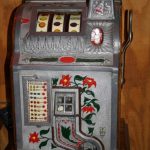 Gaming regulators are very stringent with their rules and laws. Therefore, it seems strange that they allow regular people to sell antique slot machines.
Gaming regulators are very stringent with their rules and laws. Therefore, it seems strange that they allow regular people to sell antique slot machines.
Even though these aren’t the latest games, they can still be used as gambling devices.
This makes it worth exploring why gaming regulators are more lenient when it comes to allowing unlicensed people/companies to deal in antique slots.
Antique Slot Machines Don’t Pay Much
One major reason why gaming authorities aren’t worried about antique slot machines being sold is because they don’t pay much. Some antique slots only pay a maximum of $2 or less.
This makes it unlikely that an individual would ever be able to sell a slot to, say, Caesars Palace. Caesars isn’t going to put a game on their floor that offers a $2 jackpot.
Instead, major casinos only deal with licensed game providers who deliver the latest slot machines. Antique dealers, on the other hand, are simply selling vintage games as collectibles.
Casinos would Never Make Much from an Antique
Let’s say that a casino buys an old slot from an unlicensed entity despite everything I covered above. Even if the casino is willing to break the law by buying off an unlicensed game provider, they’re not going to make much from the antique slot.
Not only will the game pay less than modern slots, but it will also be void of modern features like wild symbols, free spins, and bonus rounds.
Gaming regulators still require antique sellers to gain approval for the vintage games they’re selling. For example, an auction house would need special permission before they can auction off a batch of older slots.
But overall, gaming authorities don’t have to worry much about unauthorized antique slots hitting the casino market. It simply wouldn’t be profitable for casinos to offer these games.
